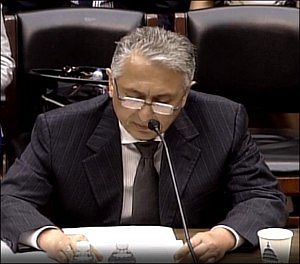“I think we must recognize that a new day of democratic development is not necessarily about to dawn in Central Asia,” Sanjar Umarov, a former Uzbek political prisoner said last week before a hearing of the U.S. Congress’ Tom Lantos Human Rights Commission. The commission heard testimony on civil and political rights in Central Asia, with a particular focus on Uzbekistan, and the implications for U.S. policy.
Representative Jim McGovern (D-MA*), after hearing the witness’ testimony, asked what can be done by the United States, and whether repeated reports and statements matter. The answers were mixed in terms of recommendations, but the panel agreed that although reports and statements hardly change the tune of authoritarianism in Tashkent and Ashgabat, they do serve a purpose.
Jeff Goldstein, of the Open Society Foundations, commented in his recommendations that while governments in Central Asia may be deaf to Washington’s remarks, the United States “should internalize the fact that the peoples of Central Asia are an important and attentive audience for official U.S. statements.”
Allison Gill, a Central Asia Expert with Amnesty International, pushed back against the declared U.S. regional policy of “strategic patience,” urging the government to engage more deeply with regional regimes, pressing for them to “allow domestic and international human rights groups to work without harassment and interference” and for Ashgabat and Tashkent, in particular, to open themselves to independent scrutiny.
Umarov’s testimony was by far the most moving and his recommendations perhaps the most realistic — urging equal parts pressure and patience. In June 2005, RFE/RL reported on Umarov, a successful businessman moving into politics in the wake of the massacre in Andijan. He founded a reform group — the Sunshine Coalition — and was pressing for Karimov to dissolve the government:
“There is one solution. If the government changes, I mean, if the president appoints new ministers and gives wide authorities to the cabinet of ministers, then good results could be achieved in a short term,” Umarov said. “What I mean is that a lot of new and progressive people should be brought to the cabinet of ministers. Many of [the current ministers] must be replaced.”
Instead, in October 2005 Umarov was arrested and sentenced to 14 years in a prison colony on embezzlement charges. “My trial on January 30, 2006 was farcical but my sentence was not,” he said Thursday. While awaiting his trial, he says a car backed up to his cell and filled it with exhaust. At the prison colony he was repeatedly tortured, including a choking that permanently damaged his vocal chords.
His spoke in a gravely voice, testifying that while “Central Asia’s leaders and elites will hardly grow less corrupt or more indulgent of criticism, dissent, opposition political activity, or an independent judiciary,” it remains important for the United States to criticize their human rights records and press for prisoner releases. In 2009, Umarov was released. “[N]ot because Uzbek authorities regretted my treatment,” he said, “but because my family organized a campaign of pressure, with the help of members of Congress, diplomats and international organizations. Eventually Tashkent concluded that my continuing imprisonment and torture were counterproductive.”
The commission’s namesake, Tom Lantos, signed a Congressional resolution on Umarov’s behalf before passing away in 2008 — part of the pressure that led to Umarov’s freedom. Lantos was born in Hungary and was the only Holocaust survivor to serve in the U.S Congress.
Umarov, and Goldstein to a certain extent, recommended focusing engagement on areas that have long-term potential: expanding youth exchanges and deepening engagement with regional parliaments. “A generational change in leadership is inevitable. Greater engagement with individuals now in parliament who may in the future play key governmental, security, and prosecutorial roles can effectively highlight the U.S. Government’s sincere, long-term goal of democratization and respect for human rights,” Umarov said. He also noted that engagemnt does not, and should not, come only from Washington: “In my own city of Memphis, Tennessee, a center is being established that will focus on developing ties with Central Asia. With all respect to Washington, I think regional centers have an important role to play in fostering economic, cultural and educational relations that will help promote democratization.”
Goldstein noted that regional governments have long forgone human security in favor of hard security and the U.S. ought to reconfigure, and broaden, its approach to security — focusing assistance on good governance, civil society, independent media, education, healthcare, employment, and democratization.
“I hope to be able one day to take a more active role in bringing reform to Uzbekistan,” Umarov said in his closing remarks. “But for now, I do what I can to help my native land even as I reside in freedom and security with my family in Tennessee.”
*The original article incorrectly identified Jim McGovern’s party, the error has been corrected

































